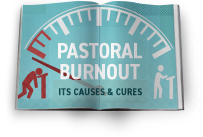Be Tender-Hearted and Thick-Skinned: How Humility Protects Pastors from Pastoral Burnout
They wanted to talk about my preaching. I hadn’t been at the church very long, but they had some concerns. A few single women recently left the church, and these deacons were convinced it was my fault. My sermons, they insisted, must be too “masculine.” I didn’t know what they meant—I still don’t! I certainly had no intention of preaching masculine or feminine sermons. Nonetheless, they weren’t pleased.
Several months later, an older couple wanted to talk. They, too, had some concerns. It was about my family. They offered constructive criticism, especially for my wife. In public, they were quite friendly and seemed to like us very much. Privately, they had reservations about us as a ministry team.
Around this time, another member told me something was wrong with the morning service. He couldn’t quite put his finger on it. He seemed glad I preached the Bible, but he wanted something a little less serious and a little more joyful. He said our gatherings didn’t have a “sense” of worship.
Welcome to ministry.
CRITICISM CAN BE HELPFUL
If you are a pastor, criticism comes with the territory. These examples are from my early years of ministry. A decade in, the church I serve has more unity than ever before. Still, there’s always criticism. Just the other day a brother said the first point of my sermon was too long. He was right! I strive to heed godly criticism.
“The ear that listens to life-giving reproof will dwell among the wise” (Prov. 15:31). Everybody needs correction, and a good leader will receive it well. “Righteous lips are the delight of a king, and he loves him who speaks what is right” (Prov. 16:13). It is right to be exhorted to change when change is necessary. It is good to be told you’re doing something wrong when you are, in fact, doing something wrong. Criticism may sting in the short-term but, if it’s true, we can embrace it as a gift from the Lord. “Listen to advice and accept instruction, that you may gain wisdom in the future” (Prov. 19:20).
IN SMALL DOSES, PLEASE
The mature pastor knows criticism is helpful, but he’d like it kept to a minimum. This is because criticism hurts. Heap too many coals on the fire, and the steak is likely to burn. Heap too much criticism on the pastor, and he’ll likely burnout. Criticism, however well-intentioned, can be harmful in large doses. No one will thrive in a perpetual state of discouragement. “Anxiety in a man’s heart weighs him down, but a good word makes him glad” (Prov. 12:25).
Unfortunately, pastors can control neither the rate nor the quality of the criticism that comes their way. Some of it is wonderful, helpful, and life-giving. Other criticism is simply unfair, unjust, and unkind. A batter can’t demand his favorite pitch, and a pastor can’t make a member be compassionate. Sometimes people say things that just aren’t true.
· “You care more about membership than people.”
· “You’ve never said a kind word to me, I don’t think you like me.”
· “You just want people to obey your commands, you aren’t really looking for input.”
· “You don’t love the older people, you just care about the young folks.”
· “You’re an okay preacher, but not much of a shepherd.”
Criticism like this may be completely unhitched to reality. Or it may have a grain of truth but be flung at you in a spiteful, hurtful way. Sheep have been known to bite their shepherd. How should pastors respond in the face of unjust criticism?
In a nutshell: don’t be thin-skinned, do be thick-skinned, and be sure to be tender-hearted.
DON’T BE THIN-SKINNED
The thin-skinned pastor won’t last very long in ministry because he will take every question about the direction of the church as a personal slight. Each member leaving feels like a dagger in his back. He has a hard time discerning between fair and unjust criticism. Spider-Man has “spider sense”—he always knows when danger is nearby. Thin-skinned pastors always seem to sense a word of criticism is around the corner.
Some thin-skinned pastors demonize their critics. They see themselves as truth-warriors and wonder why the rest of the troops aren’t falling into line. When people probe into the reasoning behind a decision, voice opposition, or simply and quietly disagree, a thin-skinned pastor takes it as a personal affront. A thin-skinned pastor may not change course, but he’s disappointed and pained by any confrontation.
Other thin-skinned pastors are so nervous they question every decision they make. When people oppose their leadership, such pastors quickly assume they must be steering the ship in the wrong direction. They base the quality of their leadership on the noise of the crowd instead of the Word of the Lord.
Either way, the thin-skinned pastor cares too deeply about what others think. Their opinion casts a long and disheartening shadow over his ministry. He always feels the need to prove himself. [i] Pastors like this build walls that keep people away. This is a dark and lonely place to be.
Simply put, thin-skinned pastors should probably not be in ministry because they will not last.
DO BE THICK-SKINNNED
A thick-skinned pastor cares more about approval from the God he worships than approval from the church he serves. He can usually sleep well on Sunday night, because he knows the kingdom of God is not shaken by his less-than-stellar sermon. He can hear bad news in the afternoon— the cancer is back, my wife has left me—and still be emotionally available for his kid’s soccer game that evening. The thick-skinned pastor finds profound comfort and strength in the reality of God’s sovereign goodness.
Because the thick-skinned pastor knows the future of his church depends on the power of the Spirit and not himself, he makes decisions that serve him and his family well. He takes the time off he needs—even if a few members may question his priorities—because he knows his family and his church need a well-rested shepherd. He’ll say no to some church functions to spend quality time with his wife and kids. He recognizes some may want him to be more available, but he proves with his schedule his family comes first. [ii]
Most importantly, a thick-skinned pastor lets the sheep chew on him because he knows, after all, they’re sheep! Christians who have received a steady diet of topical teaching for decades may bristle at the idea of going through a book of the Bible chapter by chapter. The thick-skinned pastor isn’t offended by their opposition; he patiently explains why he thinks expositional preaching is more helpful. A thick-skinned pastor may be criticized for leading a church away from special music to more congregational singing. But he doesn’t get upset when people wrongly conclude he doesn’t like music; he humbly explains why the moves he’s suggesting are for the long-term good of the congregation’s corporate worship of God.
In other words, every pastor will inevitably face a barrage of criticism. This isn’t heaven. But the thick-skinned pastor will keep his eyes on the cross, his heart in the Lord, and his hand to the plough.
And because of that, he’s more likely to last in ministry.
BE SURE TO BE TENDER-HEARTED
The skin of an elephant can withstand the sun of the Sahara Desert but, let’s face it, who wants to hug an elephant? If a thick-skinned pastor isn’t careful, he’ll seem unapproachable. He may pit fidelity to God’s Word against compassion toward God’s people.
The apostle Paul is such a good example for us here. The same man who told the Galatians he did not seek the “approval of man” likened himself to a “nursing mother taking care of her own children” when he described his ministry to the Thessalonians. Thick-skinned: Galatians 1:10. Tender-hearted: 1 Thessalonians 2:7.
Even better is the example of Jesus. He demonstrated remarkable tenderness toward those who would reject him. The Savior described himself as a “hen [who] gathers her brood under her wings” (Luke 13:34). If our King could be so gentle to Jerusalem, then shouldn’t we be compassionate to the church of the living God (1 Tim. 3:15)?
Being thick-skinned has its dangers. We can be slow to accept good criticism. We can appear stern, detached, or uninterested in others. We can assume those around us are as thick-skinned as us and give criticism in a brusque, unhelpful manner. We can speak with a force, clarity, and abrasiveness that hurts the very sheep God has entrusted to our care. [iii]
Let’s work hard to avoid such pitfalls. The members of our church are precious in God’s sight, even when they bite. If we’re too thin-skinned, we’ll cave under the weight of their disappointment in us. If we’re too thick-skinned, we’ll push away the brothers and sisters God has called us to serve and lead. Therefore, be sure to be tender-hearted. The thick-skinned and tender-hearted pastor is best positioned to minister for the long haul.
[i]See Jared Wilson, The Pastor’s Justification: Applying the Work of Christ in Your Life and Ministry (Crossway, 2013).
[ii] See Brian Croft, The Pastor’s Family: Shepherding Your Family through the Challenges of Pastoral Ministry(Zondervan, 2013).









